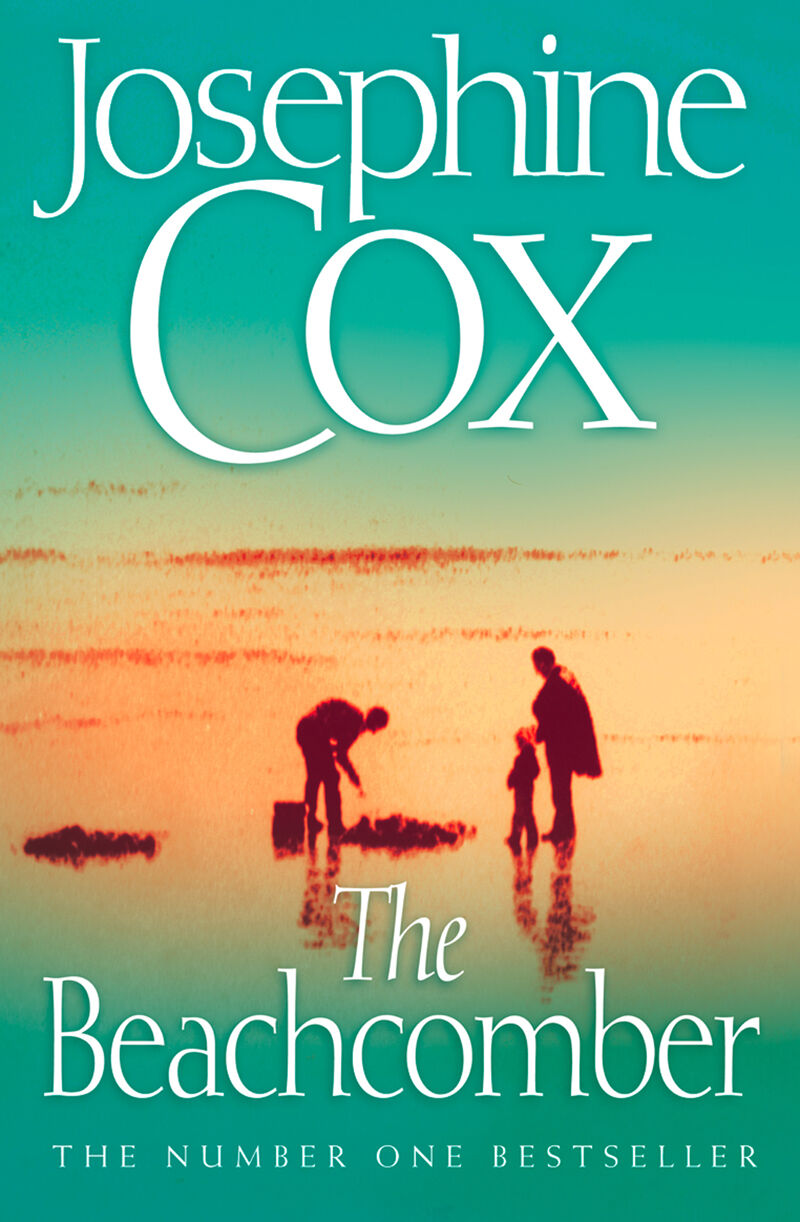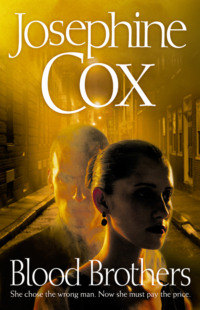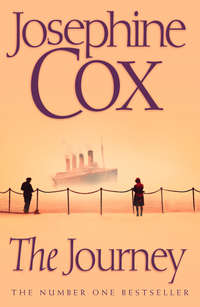
Полная версия
Classic Bestsellers from Josephine Cox: Bumper Collection

Josephine Cox Bumper Collection
Josephine Cox

Copyright
Published by HarperCollinsPublishers Ltd 1 London Bridge Street London SE1 9GF
www.harpercollins.co.uk
First published in Great Britain by HarperCollinsPublishers Ltd 2014
Copyright © Josephine Cox 2014
Cover design © HarperCollinsPublishers Ltd 2014
Josephine Cox asserts the moral right to be identified as the author of this work.
A catalogue copy of this book is available from the British Library.
This novel is entirely a work of fiction. The names, characters and incidents portrayed in it are the work of the author’s imagination. Any resemblance to actual persons, living or dead, events or localities is entirely coincidental.
All rights reserved under International and Pan-American Copyright Conventions. By payment of the required fees, you have been granted the non-exclusive, non-transferable right to access and read the text of this e-book on screen. No part of this text may be reproduced, transmitted, down-loaded, decompiled, reverse engineered, or stored in or introduced into any information storage and retrieval system, in any form or by any means, whether electronic or mechanical, now known or hereinafter invented, without the express written permission of HarperCollins.
Ebook Edition © February 2014 ISBN: 9780007577262
Version: 2017-05-23
Table of Contents
Cover
Title Page
Copyright
The Beachcomber
Lovers and Liars
Live the Dream
The Journey
Journey’s End
The Loner
Songbird
Born Bad
Divorced and Deadly
Blood Brothers
Midnight
Three Letters
The Broken Man
Keep Reading
About the Publisher

JOSEPHINE COX

The Beachcomber

DEDICATION
This book, and every book I will ever write,is for Ken, a man amongst men,my soulmate and inspiration forever.
CONTENTS
COVER
TITLE PAGE
DEDICATION
PART ONE
CHAPTER ONE
CHAPTER TWO
PART TWO
CHAPTER THREE
CHAPTER FOUR
CHAPTER FIVE
CHAPTER SIX
CHAPTER SEVEN
CHAPTER EIGHT
CHAPTER NINE
CHAPTER TEN
CHAPTER ELEVEN
CHAPTER TWELVE
CHAPTER THIRTEEN
CHAPTER FOURTEEN
CHAPTER FIFTEEN
CHAPTER SIXTEEN
CHAPTER SEVENTEEN
CHAPTER EIGHTEEN
CHAPTER NINETEEN
CHAPTER TWENTY
PART THREE
CHAPTER TWENTY-ONE
CHAPTER TWENTY-TWO
CHAPTER TWENTY-THREE
Chapter 1
‘WHAT THE HELL does he think he’s doing!’ As the car lurched forward, Tom fought to keep control. He had been taken by surprise when the car following seemed to deliberately crash into his bumper.
‘He’s coming at us again, Daddy!’ The two children in the back were thrown hard against the seat-backs by the first bump. They screamed a warning as the other car surged towards them a second time. There was a moment of chaos before the impact sent them hurtling towards the clifftops. ‘JESUS!’ He couldn’t hold it! They were going over … dear God, they were going over, and there was nothing he could do!
In that split second as he tried desperately to swing the car round, Tom glanced again through his rear-view mirror, needing to know who his attacker was, why he would want to hurt them. The car was a blue Hillman Minx, he thought, and the driver was crouched over its steering wheel, with a Homburg hat pulled low over his forehead and dark glasses hiding his eyes. It was impossible to get any idea of what he looked like. ‘Crazy bastard … back off. BACK OFF!’ In response Tom felt the violent impact as they were hit again, and again. Wrenched out of his hands, the steering wheel seemed to spin out of control.
‘God help us!’ His wife’s frightened voice penetrated the chaos of his mind. ‘Children! Get down behind the seats!’ she ordered fearfully. He heard the pitiful whimperings of his two children as they clung to each other. He saw his wife, strangely silent now, her face shocked with disbelief as she glanced back at their attacker. ‘My God!’ Suddenly she was on the seat, frantically attempting to reach the children, but it was too late.
When the car rammed them yet again, they lurched forward, the windscreen shattering all over them, the other driver showing no mercy. Determined, he stayed with them, revving up, sending them forward towards the edge, fast and furious.
Everything was happening so quickly … a matter of seconds, no more. There was no time to escape. By now the car was badly dented; the doors were jammed tight. Tom had tried everything in his power and it wasn’t enough. All manner of powerful emotions swept through him: disbelief; helplessness; and now sheer horror as the car became airborne.
There was a moment of eeriness, when the car appeared to pause in mid-air before the nose dipped and they fell into a downward plunge towards the rocks below. ‘Oh, dear God!’ Throwing himself across his wife, he yelled for the kids to ‘STAY DOWN! HOLD ONTO EACH OTHER!’ He could hear them sobbing, and now the soft, shivering sound of his wife’s voice in prayer. Death was only a heartbeat away.
He would not remember the thud as they bounced onto the rocks and rolled over and over, crashing and breaking towards the beach; nor would he recall the screams of people who scattered in all directions as the car skidded at breakneck speed towards the sea-edge. The clanging bells of the ambulances and police cars as they rushed to help fell on deaf ears. Like his wife and children, he was beyond all that.
The next thing he knew he had awoken in hospital. Bruised and battered, both his legs were broken and his neck was in a brace. When he woke it was with a scream for the children to ‘GET DOWN, KIDS … HOLD ON!’ In that unbelievable moment, his mind was alive with the memory of what had happened.
‘It’s all right … ssh!’ Gently the nurse settled him down again, her heart aching for what he must soon learn.
Later they told him that there was nothing they could have done to save Sheila or the children. ‘We tried and failed,’ the surgeon told him, hands outstretched and an expression of hopelessness on his kindly face. ‘I’m so sorry.’
The car had turned over on top of them. Tom himself had been thrown clear … lucky to be alive, they said. But he wasn’t ‘lucky’! He was angry, seething with a need to kill. Then he was sobbing, crippled with utter loneliness.
All through that terrible night the questions had burned bright in his mind. Who was the madman who had run them off the road? Why did he do it? WHY?
There were no answers, because in the months that followed, in spite of the police relentlessly pursuing even the minutest clue, the driver of that car was never found, nor was the car itself. Tom had described both as accurately as he could, but it was as though they had vanished off the face of the earth. They had spoken to owners in the area whose cars had been stolen around the time of the accident, but until and unless they found the vehicle itself, that wasn’t of much help.
When eventually Tom was released from hospital, he too made every effort to trace the man who had taken his family and ruined his life. Time and again in the following months, he returned to the scene, speaking with anyone who would listen. All to no avail. The evil that had visited him and his family seemed to have gone as swiftly as it came.
But the consequences of that fateful day would never leave him. Neither would the hatred he felt.
Now, almost a year later, all that was left for Tom was the awful nightmares when, in his deepest sleep, he would re-enact the terrifying scene, hearing his children screaming, and Sheila, at first strangely silent, then frantically reaching out to protect her children … and all of them, helpless.
The dreams were so real and vivid, he would often wake up, arms flailing, yelling for the children to, ‘Get down on the floor, kids! FOR GOD’S SAKE, HOLD ONTO EACH OTHER!’
‘Are you all right?’ a gentle voice enquired. Tom opened his eyes, shocked and ashamed when he realised where he was.
‘You were having a bad dream.’ The elderly woman seated beside him could see the sweat shimmering on his face and the look of pain in his eyes. ‘Can I get you something?’
He shook his head. ‘I’m all right, thank you. I didn’t mean to fall asleep,’ he apologised. ‘It’s just that trains always make me nod off.’ He smiled to ease the tension.
The woman nodded. ‘I was worried, that’s all.’ She lowered her voice. ‘You were moaning … upset.’
He grimaced. ‘It was just a bad dream.’ When she smiled and looked away, he found refuge in his newspaper.
But there was no refuge in his heart.
The woman frowned to herself. A lot of young men had come back from the war in a terrible state. Poor chap; it must be that.
As the train chugged onwards, the billowing steam outside his window blocked his vision. His mind came alive with thoughts of how it used to be. He saw them all in his mind’s eye: the woman he had loved, small and slim with big bright eyes and a smile that could light up a cloudy day. And the children: Ellie, quiet and reflective with a gentle nature, and Peter, the younger one, wild and wilful, with a free, adventurous spirit. So different, yet so alike, in their kindness and generosity.
Reaching into his pocket he took out his wallet, pulling out a small photograph of them all … Bournemouth Sands, June 1951. His heart fell like a stone inside him. It seemed incredible to think that that wonderful holiday was just a year ago, and now, God help him, there would be no more.
‘Is that your family?’ The kindly old soul pointed at the photograph as he returned it to his pocket. ‘I always wanted a daughter, but was never blessed with another child.’
Gesturing to his pocket, she added, ‘Lovely-looking children.’ Giving the cheekiest of winks, she whispered, ‘Mind you, I can see how they might be handsome, with a father as attractive as you.’
Smiling and embarrassed, he wasn’t quite sure how to answer that, so he glanced out the window and pretended to be interested in the shifting landscape.
The woman saw his embarrassment. She thought him too good-looking for words. Discreetly observing the dark blue eyes, and the thick shock of golden-brown hair, she was sent back to her youth, when she could have had the pick of any young man. Sadly those days were gone and now, grey and old, she had too many regrets to contemplate.
‘I don’t mean to embarrass you,’ she apologised, ‘but when I’m anxious, I tend to talk a lot.’ Her face crumpled into a frown. ‘I must admit I hate these trains – noisy, dirty things. And I mean … you’re not in control, are you?’
‘We’re never “in control”,’ he answered thoughtfully. He knew all about that. He knew from experience how one minute everything was perfect, filled with love and joy, and, before you knew it, your whole world was turned upside down.
The steam whistle blasted noisily as they entered a tunnel. ‘Ooh!’ The old woman shivered. ‘I’ll be glad to reach London. I know I shan’t relax till then.’
He nodded. ‘You’re doing fine,’ he answered; then turned away to concentrate his thoughts.
Thinking she was becoming a nuisance, she tutted. ‘I’m sorry … keep chatting away … I hope you don’t mind?’
‘No. You talk away, if it helps,’ he suggested with a smile. ‘I really don’t mind.’
‘Only, you’ve been so quiet since I sat beside you, I thought you might be one of those people who like to be left alone?’ She giggled like a schoolgirl. ‘My son warned me not to be a nuisance. He knows how some folks don’t want to be bothered. You will tell me if I’m being a nuisance, won’t you?’
‘I promise, you’re not being a nuisance.’ He shook his head. ‘It’s just that I never find it easy to strike up a conversation.’
Encouraged, she chatted on about the new Queen, and when a short time later she started to nod off, he began to relax. When he relaxed, however, it was inevitable that he should be overwhelmed by the faces of the woman and children in that photograph. He had loved them with a passion that frightened him. Now, they were gone and all he had left was memories … of when they were walking in the park, he and Sheila laughing at the children’s antics, and afterwards eating in that pretty little café by the riverside, where they would throw leftovers to the ducks.
The memories rolled through his mind like the reel of a film. For one precious minute they made him smile; then they were breaking his heart.
‘Do you think it will be long before we get there?’ The elderly woman woke as suddenly as she had nodded off. ‘I’ve never been to London before. I wouldn’t be going now, if my only son hadn’t taken his family and moved down there.’ She continued wistfully, ‘I’ve got four beautiful grandchildren. I’ve missed them.’
Attempting to reassure her, he replied confidently. ‘Won’t be long now,’ he said. ‘And London’s fine. After a while you get used to it. I work for a big development corporation there,’ he confided.
She gave a wry grin. ‘I would have gone with them,’ she admitted. ‘My son wanted us to, but my husband is a cantankerous old sod. The furthest he’ll go is to the bottom of the garden and back.’
He smiled pensively. ‘I envy him.’
‘Why’s that?’ She was genuinely surprised by his statement.
‘Why, because he sounds contented.’ He would have given anything at that moment to be ‘contented’.
She gave a sorry little smile. ‘Unlike me! I’ve always been discontented! All the years we’ve been wed, I was the one who loved the dancing and going out – especially during the war, you know – but he was never that way inclined. He was an ARP warden. I expect that was enough excitement for him. If he could he’d be happy to sit by the fireside of a winter’s night, and potter about in the garden in the summer. I always put it down to laziness or lack of enthusiasm, but now I think about it, you could be right.’
His remark made her wonder. ‘Happen he’s just been “contented” all along.’ She gave a long, weary sigh. ‘It’s sad really. We’ve always been so very different in what we want. But he so depends on me, you see.’
When the tears rose in her eyes and she abruptly returned her attention to her book, he felt desperately sorry for her. He could imagine how this dear old woman and her husband might be mismatched; he assumed there were many couples like that: having stayed too long together, it was now too late for any chance of a new life for either of them.
Looking away, he peered out to where the countryside resembled a giant eiderdown, with misshapen patches of browns, yellows and melting shades of green. In the far distance, beyond the cotton-wool puffs from the train’s funnel, he could see a lake, shimmering and twinkling. At other times that beautiful sight would have gladdened his heart, but not now.
His own thoughts invaded the quietness. He had tried to go on, but it was impossible. This latest trip had been sheer hell! He found he could no longer conduct his business in that sharp, decisive way he used to. Too many things played on his mind. Dear God! Would there ever be any peace?
Right now, he didn’t even want to think about it. He wanted to wake up and find it was all a nightmare, that all was well and his family would be waiting at home, just like always. He laughed softly, a hard, cynical emotion cutting through his heart like a knife. It was not a nightmare, and he would not wake up from it; not for a long time; maybe never. Anger invaded his senses. A feeling of utter hopelessness swept through him. Life was a cruel master!
The last he saw of the old woman was in the train terminal. She looked a sorry sight as she trundled after the porter who carried her tiny suitcase. ‘I hope things turn out all right for you,’ he whispered and, almost as though she had heard, she suddenly turned to smile at him. He gave a small wave, she nodded, and in a moment was gone from his sight.
Hurrying to the taxi rank, he climbed into the first cab in the line. ‘Where to, sir?’ The cabbie was a rough-and-ready fella, going grey and slow in his step. Tom couldn’t help but notice the long scar running down the side of his face. ‘Got from running wild as a kid,’ he explained, anticipating Tom’s curiosity. ‘I’ve an interesting tattoo of a snake an’ all –’ he gave a hearty laugh – ‘but you wouldn’t want to know about that.’ Opening the cab door, he gave a cheeky wink. ‘I were drunk at the time … regretted it ever since.’
His imagination running riot, Tom didn’t dare ask. ‘We’ve all done things we regret,’ he answered with a friendly smile.
‘Not you! A man like yousel’? By! I should think you’ve got the world at your feet.’ When Tom made no comment he closed the cab door and climbed into the driver’s seat. ‘It might help if I knew where I were going,’ he quipped good-naturedly.
Having given him the address of his flat in Hammersmith, Tom leaned back in his seat. He suddenly felt incredibly weary … tired of his job; tired of trying to piece together his life. Tired of being so alone.
The cabbie discreetly regarded him through his mirror. ‘If you don’t mind me saying, guv, you look like you could do with a good night’s sleep.’ Suddenly swerving to avoid a delivery boy on his bicycle, he let loose a volley of abuse at the rider. ‘Watch where you’re going, mate!’ Leaning out the window, he screamed at the frightened fellow, who had done nothing wrong. ‘If you’re fed up wi’ life, throw yousel’ off a bleedin’ railway bridge!’
Having been flung clear across the seat, Tom righted himself and sat tight.
Completely oblivious to the chaos he’d caused, the cabbie asked, ‘Away on business, was you?’
‘Yes,’ Tom acknowledged.
‘I expect you glad to be ’ome, eh?’
‘Right again.’ But what was he coming home to? No family. No real home, and nothing worthwhile to look forward to. His life was work and more work. These past weeks he had been seriously wondering if he should give it all up. Now, as the idea loomed large in his thoughts, it seemed to overwhelm everything else.
‘What is it you do?’ the cabbie asked.
‘I’m one of three architects in a big development organisation. We build office blocks, factories, large housing developments, that sort of thing. There’s never two jobs the same.’ Wasn’t it strange, he thought, how you naturally imparted your business to a cabbie. Probably it was because you never expected to see him again.
Turning a corner, the cabbie grinned at him through the mirror. ‘By! You must lead an exciting life? Plenty to build an’ all, now the country’s back on its feet.’
Lapsing into silence, Tom let him chat on.
‘I’ve allus wanted to travel, but never had the time nor money. I’ve got six kids and a wife who spends like money’s gone outta fashion. I work six days a week, from seven of a morning till late at night. What chance ’ave I got to see the bleedin’ world, eh?’
He gave a loud, raucous laugh. ‘Matter o’ fact, I can never understand where I found the time to make all them bloody kids! Come to think of it, I can’t even remember enjoying mesel at it, neither!’ Taking his eyes off the road to peer through the mirror at Tom, he added, ‘D’you know what, matey? I’ve often wondered how many o’ them kids belong to that smarmy bleedin’ milkman!’
‘Well, for what it’s worth, I think you’re a lucky man.’ In truth, Tom envied him.
‘Oh! You reckon, do you?’ Astonished, the cabbie afforded himself another glance at his passenger. ‘Here’s me … a poor ol’ chap, working all hours God sends, and like as not them two having it off behind my back. An’ you say I’m a lucky man?’ He laughed aloud. ‘Hey! Happen you’re right. Happen he should tek her an’ the kids off me ’ands, and leave me to enjoy mesel.’
Tom defended his comment. ‘What I meant was … any man who’s got a wife and children who love you … has to be a lucky man.’
‘Ah! But how do I know if they’re my kids?’ His tone grew serious. ‘No man likes being cheated on.’
Sensing the cabbie’s abrupt change of mood, Tom wisely avoided being drawn into the subject too far. ‘Look! The traffic’s building up.’ He gestured to the road ahead, and the many vehicles vying for space. Since petrol rationing had ended, traffic had increased.
Swinging his taxi round a crawling trolleybus, the cabbie cursed, ‘Bleedin’ drivers! At least we’ve seen the last of the trams!’
Having got in front of the trolleybus, he refocused his curious gaze on Tom. ‘It’s a busy time o’ day, as you must well know, guv … you living ’ere an’ all that.’
After a while the cabbie lapsed into a pensive mood, and it wasn’t long before they reached Hammersmith. ‘’Ere we are, guv!’
Drawing his cab into the kerb outside a large, handsome building, the cabbie remarked with a whistle of appreciation, ‘Nice flats these … cost a pretty penny too, I shouldn’t wonder.’ He clicked his tongue in admiration. ‘I wouldn’t mind living in a posh place like this … all on me own where the brats and the missus can’t find me.’
Climbing out, Tom had his fare at the ready, which he handed to the driver, together with a generous tip, and a word of friendly advice. ‘You wouldn’t like it,’ he said. ‘You’d be lonelier than you can ever imagine.’
His words appeared to hit home, because suddenly the cabbie was deeply thoughtful. ‘You could be right,’ he answered. ‘Besides, what about that bleedin’ milkman, eh? If I weren’t there to keep an eye on him, Gawd knows what he’d be getting up to wi’ my missus!’ His loud raucous laugh echoed down the street. ‘By! He’d want to be delivering more than the milk … if he ain’t done already!’
Shaking his head, and with a wide grin on his face, Tom watched him drive off.
He was still chuckling as he entered the lift; though by the time he had reached his flat on the sixth floor the smile had slipped and the same idea that had haunted him these past weeks began to invade his thoughts again. ‘It’s time,’ he murmured. There was no doubt in his mind now. ‘Time to leave it all behind.’
Letting himself into the luxurious, soulless place that he now called home, he felt a wave of relief that the decision was made. ‘I need to get away from London … and all the bad memories.’ If he didn’t leave soon, he suspected he might go crazy.








